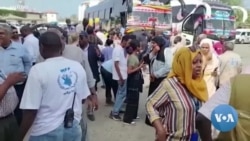A United States-brokered three-day cease-fire between Sudan’s warring factions appeared to be mostly holding Tuesday in the capital, Khartoum, although witnesses reported some ongoing fighting between the army and paramilitary forces.
Both the Sudanese Armed Forces and the Rapid Support Forces publicly pledged to uphold the halt in fighting.
“To support a durable end to the fighting, the United States will coordinate with regional and international partners, and Sudanese civilian stakeholders, to assist in the creation of a committee to oversee the negotiation, conclusion, and implementation of a permanent cessation of hostilities and humanitarian arrangements in Sudan,” U.S. Secretary of State Antony Blinken said in a statement.
But the World Health Organization warned of a new problem: a “huge biological risk” after one of the sides in the Sudan conflict occupied a lab that holds measles, polio and cholera pathogens, along with other hazardous materials.
SEE ALSO: A related video by VOA's Cindy Saine
Nima Saeed Abid, the WHO's representative in Sudan, did not specify which side was involved, but told reporters the situation was “extremely dangerous.”
"This is the main concern: no accessibility to the lab technicians to go to the lab and safely contain the biological material and substances available," he said.
At least 427 people have been killed and more than 3,700 wounded, according to U.N. agencies, since fighting began April 15. Some Khartoum neighborhoods have been left in ruins.
U.N. Secretary-General Antonio Guterres on Monday called on U.N. Security Council members “to exert maximum leverage with the parties to end the violence, restore order and return to the path of the democratic transition.”
The Security Council is scheduled to hold a meeting about Sudan on Tuesday.
Guterres also said the U.N. is not leaving Sudan but has temporarily relocated “hundreds” of staff members inside and outside of the country.
Amid the fighting, countries have rushed to evacuate their diplomats and citizens. In all, more than 4,000 people have fled Sudan in foreign-organized evacuations that began on Saturday, including by sea to Saudi Arabia and by aircraft to Jordan and Cyprus.
Canada, Egypt, France, Germany, Italy, Sweden, Ukraine and the United States are among the countries using aircraft and convoys to ferry foreign nationals out of the country.
A majority of U.S. government personnel who evacuated the Sudanese capital, Khartoum, arrived Monday afternoon in Washington.
Britain’s foreign office said it began an evacuation effort Tuesday with flights leaving from an airfield outside of Khartoum.
China’s foreign ministry said Tuesday most of its nationals had been safely evacuated.
Sudanese nationals are fending for themselves amid power blackouts and loss of internet service.
Some Sudanese have made the decision to escape in cars and buses on the dangerous roads.
VOA's Margaret Besheer at the United Nations contributed to this report. Some information for this report came from The Associated Press, Agence France-Presse and Reuters.










